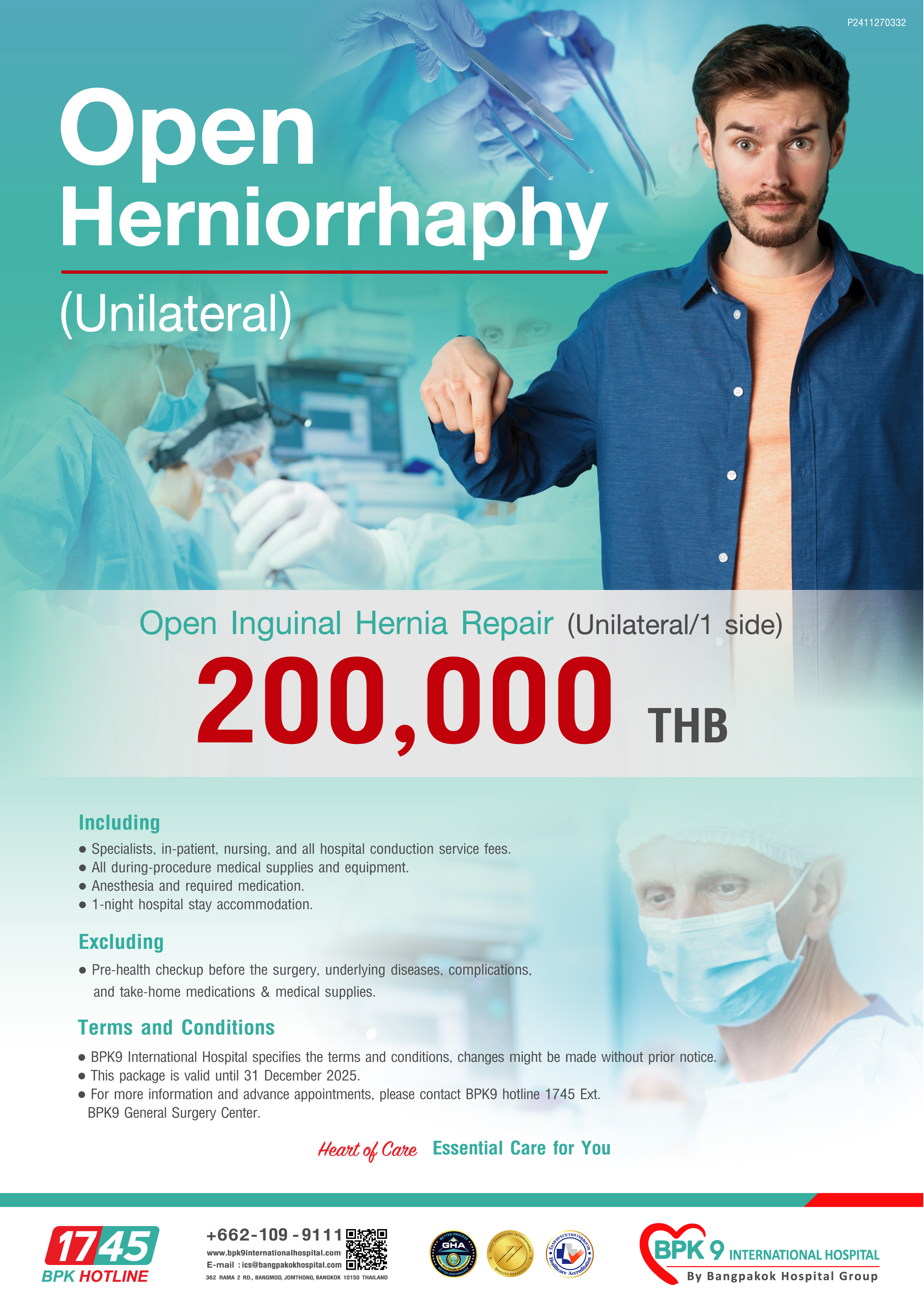Open Herniorrhaphy

Hernia is a disorder in which a part of the body protrudes abnormally through a tear or opening in an adjacent part of the muscle or tissue wall that holds it, especially of the abdomen or groin. Surgery is the most common treatment for a hernia. Hernia surgery allows colorectal surgeons to push the organ and herniated tissue back into place and reinforce the barrier holding it there using stitches or surgical mesh (a medical device used to provide support to damaged or weakened tissue during surgery). Open inguinal hernia repair is considered a safe and effective way to treat hernias. It is often recommended for hernias that are causing pain or other symptoms, or for incarcerated or strangulated hernias.
Open inguinal hernia repair surgery is often performed under local or regional anesthetic injected into the spine. This means the patient will be awake during the procedure, but the area being operated on will be completely numbed so the patient will not experience any pain. Sometimes a general anesthetic is used, and the patient will be asleep during the procedure and will not feel any pain. Once the anesthetic has taken effect, the colorectal surgeon makes a single cut (incision) over the hernia. This incision is usually about 6 to 8cm long. The surgeon then places the lump of the bowel back into your abdomen after that, a mesh is placed right in the abdominal wall, at the weak spot where the hernia got through, to strengthen it. And when the repair surgery is complete, your skin will be stitched up with absorbable sutures, these usually dissolve or disintegrate over time within a few days of the post-operation.
This open inguinal hernia repair surgery takes 30 to 45 minutes, and the patient has to stay at the hospital for 1 night. However, if the hernia has become more complicated like; strangulated, and/or part of the bowel is damaged, the affected segment may need to be removed and the two ends of the healthy bowel rejoined, with such complications the repair may take up to 5 hours for more complex repairs and the patient may need to stay in the hospital longer. Most patients can make a full recovery, and return to their normal light activities after the repair surgery 3 weeks or a month, and strenuous exercise in 6 weeks.
Safety of open inguinal hernia repair surgery
Open surgery for inguinal hernia repair is safe. The recurrence rate is low when open hernia repair is done by an experienced colorectal surgeon using mesh patches. Synthetic patches are now widely used for hernia repair in both open and laparoscopic surgery. The chance that a hernia needs more than one repair also depends on your age and overall health.
Benefits of open inguinal hernia repair surgery, including:
- Prevent more complications: Open inguinal repair surgery repairs the hernia and helps prevent complications that can occur or develop in the future, such as incarcerated or strangulated hernias.
- Improve quality of life: As the repair surgery is done to correct the hernia, the patient can experience a reduction in pain and discomfort and an improvement in their quality of life.
- Reginal or spinal anesthesia is applicable: This allows those patients who are at risk of complications from general anesthesia to still have a repair surgery performed.
- It is more economical than laparoscopic techniques: Open hernia repair surgery is generally less expensive than laparoscopic hernia surgery because the laparoscopic technique is equipped with other special equipment
- Cosmetic purposes: Open surgery can result in better cosmetic outcomes due to the surgeon can remove excess tissue and tighten the skin.
- No requirement for expensive equipment: Open hernia repair surgery doesn't require expensive instruments, or dedicated, special equipment to operate with.
There are some complications that can take place like; bleeding that can occur during surgery or after, infection at the surgical site or involving the mesh, urinary retention, allergic reaction due to stimulation of the bladder nerves, nerve damage resulting in pain or numbness, blood clots, chest infection, hernia recurrence, damage to the blood supply of the testicle, and more.
The overall risk of complications after inguinal hernia surgery is between 15–28%. Complications are more likely if you are over 50 years old, smoke, or have other illnesses involved.
About the package:
Including
- Specialists, in-patient, nursing, and all hospital conduction service fees.
- All during-procedure medical supplies and equipment.
- Anesthesia and required medication.
- 1-night hospital stay accommodation.
Excluding
- Pre-health checkup before the surgery, underlying diseases, complications, and take-home medications & medical supplies.
Terms and Conditions
- BPK9 International Hospital specifies the terms and conditions, changes might be made without prior notice.
- This package is valid until 31 December 2025.
- For more information and advance appointments, please contact BPK9 hotline 1745 Ext. BPK9 General Surgery Center.

